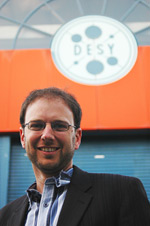From the editor: The challenge of change
 |
| Photo: Barbara Warmbein, DESY |
The world of particle physics is changing. In a few years time, most large particle colliders will have closed; the only one left operating will be the Large Hadron Collider at CERN outside Geneva, Switzerland. Although plans are under way for future facilities to address compelling scientific questions, nothing is set in stone, and start dates will depend as much on political factors as on scientific and technical ones.
Laboratories are approaching the future in different ways, determined by their individual circumstances.
The German laboratory DESY has just closed its proton-electron collider, HERA (see The End of the HERA Era). Even so, DESY sees a future strongly engaged in particle physics. DESY scientists will collaborate in LHC experiments and continue to play leading roles in the International Linear Collider. DESY will also play a major role in photon science through the FLASH X-ray light source.
Change is also on the way at Japans KEK laboratory, which operates a B factorya particle collider that generates large numbers of b mesonsand a light source. They will be joined next year by a new high-intensity proton accelerator at the J-PARC research complex. With the B-factory approaching its initial goal for data collection, KEK too will enter a new phase and will soon have to decide on its roadmap.
In the US, the Tevatron Collider at Fermi National Accelerator Laboratory and PEP-II at Stanford Linear Accelerator Center will shut down in the next few years.
SLAC will retain an active particle physics effort, including participation in the ATLAS experiment at the LHC and research and development for the ILC. Its also expanding its photon science program with the Linac Coherent Light Source, which will use intense X-rays to probe materials, chemistry, physics and the workings of living things.
Fermilab confronts a challenging future. As a single-purpose laboratory dedicated to particle physics, its work has centered on the Tevatron. The lab is heavily involved in the LHC, has a strong program in particle astrophysics and is committed to making the ILC happen, as well as host it. But in the event that international political negotiations delay the ILC, Fermilab has proposed a plan (see Fermilab’s Path to the Future) to ensure a healthy future.
There is uncertainty ahead, but scientists are used to dealing with challenges. The plans in place for particle physics laboratories promise exciting and productive years ahead.
David Harris, Editor-in-chief
Click here to download the pdf version of this article.


